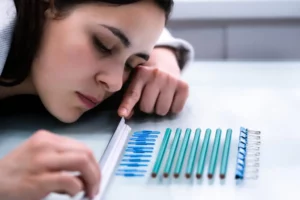Living with OCD and bipolar disorder can be really tough. These conditions can change how you feel and act in big ways, affecting your work, friendships, how you feel about yourself, and what you do every day. If you have OCD and are also dealing with sudden mood changes, you might be wondering if this is part of bipolar disorder.
Well sometimes, people have both OCD and bipolar disorder at the same time, which is called comorbidity. It can make things more complicated, but understanding how they are linked can really help.
In this blog, we’ll look into how OCD and bipolar disorder are connected and share some tips on how to handle them. So, if you’re facing these challenges, this blog can help you figure out what’s going on and find ways to feel better.”
Contents
What Is OCD?
 Obsessive-compulsive disorder (OCD) is an anxiety disorder characterized by intrusive and persistent thoughts, impulses, or images that are experienced as uncontrollable and distressing. People with OCD often engage in repetitive behaviors such as counting, checking, cleaning, or organizing things in order to reduce tension or prevent something bad from happening. People in this condition get to indulge in intrusive thoughts that cause anxiety. To suppress the anxiety they are more prone to start to perform repetitive activities which is compulsion behavior.
Obsessive-compulsive disorder (OCD) is an anxiety disorder characterized by intrusive and persistent thoughts, impulses, or images that are experienced as uncontrollable and distressing. People with OCD often engage in repetitive behaviors such as counting, checking, cleaning, or organizing things in order to reduce tension or prevent something bad from happening. People in this condition get to indulge in intrusive thoughts that cause anxiety. To suppress the anxiety they are more prone to start to perform repetitive activities which is compulsion behavior.
These obsessions and compulsions can be of some specific type just as religious, sexual, aggressive, or fear of contamination. It generally affects people’s daily life and might disturb routine tasks.
What Is Bipolar Disorder?
Bipolar disorder is a mental health condition characterized by extreme mood swings, from elevated periods of intense energy and euphoria to deep lows of depression. It can affect how you think, feel and act. During low-energy times, people with bipolar disorder may feel extremely down, hopeless, and even suicidal. During the elevated times, they might feel overly excited or irritable and take part in risky behaviors such as substance abuse or reckless spending.
Mania And Hypomania
Mania is a condition of mood that makes it hard for people to function and have psychosis experience. It is a state of normally elevated or irritable mood, energy, and activity levels. Hypomania is a sub-part of it and it is slightly milder than mania but still includes some of the same symptoms. Mania can often be accompanied by delusions which are false beliefs that one has even though there is no evidence or proof of them. Here are some of their symptoms:
- Excessive talking and racing thoughts.
- Increased energy, activity, restlessness
- Poor judgment and impulsiveness
- Euphoria or a feeling of being “high”
- Having less sleep or even no sleep
- Distractibility, difficulty concentrating
- Aggressive and extraordinary behavior.
- Overspending without any concern and doing drugs or alcohol.
- Fast-talking and acting awkwardly.
Are OCD And Bipolar Disorder Linked?
Here we have stated how bipolar disorder and OCD are inter-related by showing some of their similarities and differences:
Similarities
 OCD and bipolar disorder, both have such signs that badly affect a person’s functioning and life routine. Some of them are given below:
OCD and bipolar disorder, both have such signs that badly affect a person’s functioning and life routine. Some of them are given below:
- Disturbing And Obsessional Thoughts
In OCD, one experiences intrusive thoughts that interfere with functioning. Similarly, In bipolar disorder, people also experience racing thoughts and delusions of grandeur during mania or hypomania episodes. The obsessional recurring thoughts in OCD and elevated moods in bipolar disorder can both impair the performance of daily activities. - Anxiety And Depression
Both of these mental health conditions share the common symptoms of anxiety and depression. People with OCD can have severe anxiety that affects their daily lives, while people with bipolar disorder may experience depressive periods in between manic or hypomanic states. - Change In Sleep And Appetite
People with OCD or bipolar disorder may experience changes in their sleep and appetite. People with OCD often have difficulty sleeping or may experience insomnia, while people with bipolar disorder might experience oversleeping during depressive episodes. - Social Issues
People with OCD or bipolar disorder may also experience social issues such as problems of forming and maintaining relationships. This could be due to the symptoms of both these conditions like difficulty in concentration, lack of empathy, confusion, and irritability.
Different Symptoms
 Despite the similarities mentioned above, there are many differences between OCD and bipolar disorder. Some common symptoms that differ between these two mental health conditions are given below:
Despite the similarities mentioned above, there are many differences between OCD and bipolar disorder. Some common symptoms that differ between these two mental health conditions are given below:
- Mood Changes
In OCD, one may experience repetitive behaviors like washing hands or cleaning excessively to reduce fear or anxiety. On the other hand, people with bipolar disorder don’t usually have such compulsions but may show risky behaviors during manic and hypomanic episodes. - Psychosis
In OCD, one may not experience psychosis but in bipolar disorder, people can experience delusions and hallucinations during manic or hypomanic episodes. - Being More Talkative
People with OCD tend to be more quiet and reserved, while people with bipolar disorder may be more talkative during manic episodes. It is important to understand that both these conditions can co-occur and it is necessary to consult a doctor for proper diagnosis and treatment.
Causes Of OCD And Bipolar Disorder
It is also necessary to find out the underlying causes of OCD and bipolar disorder. Both these mental health conditions have different etiologies but can co-occur in some cases which are:
Biological Factor
Genetic factors are one of the main causes of OCD and bipolar disorder. Also, certain brain chemicals like serotonin and dopamine play an important role in both OCD and bipolar disorder.
Family History
A family history of either mental disorder increases the risk of developing both OCD and bipolar disorder. It is important to note that genetic factors can play a role in both these conditions but environmental factors may also contribute.
Environmental Factors
Environmental factors such as stress, trauma, and abuse can trigger the symptoms of Obsessive-compulsive disorder or bipolar disorder. Stress and anxiety can exacerbate symptoms of OCD while traumatic experiences can trigger manic or depressive episodes in bipolar disorder.
How To Diagnose OCD And Bipolar Condition?
It is important to consult a mental health professional for proper diagnosis and treatment. Doctors can use a range of psychological as well as physical tests to determine the presence of OCD or bipolar disorder. Psychologists may use questionnaires, interviews, and other assessments to diagnose OCD and bipolar disorder. These tests are used to assess one’s behavior, cognitive abilities, and emotions. They can also help to rule out any physical ailments that may be causing mental health issues.
How To Overcome Bipolar Disorder And OCD?
The treatment of both Obsessive-compulsive disorder and bipolar disorder depends on the severity of the symptoms. In mild cases, medications and therapy may be enough to manage the condition. Check these solutions to control both of the conditions:
Treatment for OCD and Bipolar Disorder
 Managing both bipolar disorder and comorbid Obsessive-compulsive disorder effectively often starts with stabilizing the mood. This typically involves using a combination of medications. Let’s take a closer look at the common medications used for bipolar disorder:
Managing both bipolar disorder and comorbid Obsessive-compulsive disorder effectively often starts with stabilizing the mood. This typically involves using a combination of medications. Let’s take a closer look at the common medications used for bipolar disorder:
- Anticonvulsants: These are used to stabilize mood and may include examples like Valproate (Depakote), Lamotrigine (Lamictal), and Carbamazepine (Tegretol).
- Antidepressants: While used with caution due to the risk of triggering manic episodes, antidepressants can be part of the treatment plan. Examples include Fluoxetine (Prozac), Sertraline (Zoloft), and Bupropion (Wellbutrin).
- Antipsychotics: These can help manage symptoms of mania and psychosis. Common ones are Olanzapine (Zyprexa), Quetiapine (Seroquel), and Risperidone (Risperdal).
- Lithium: A cornerstone in the treatment of bipolar disorder, lithium is effective in controlling mania and preventing the recurrence of both manic and depressive episodes.
In addition to medication, therapies play a vital role in the treatment of bipolar disorder. These include psychoeducation, cognitive-behavioral therapy (CBT), and family-focused therapy, all aiming to provide support, education, and strategies for managing the disorder.
When it comes to treating OCD, a similar long-term approach is used, combining medication with therapy. Medications like SSRIs (Selective Serotonin Reuptake Inhibitors), such as Fluoxetine (Prozac), Sertraline (Zoloft), and Paroxetine (Paxil), are commonly prescribed.
Therapy, particularly cognitive-behavioral therapy (CBT), is crucial in treating OCD. A specific type of CBT, known as Exposure and Response Prevention (ERP), is often used. This involves gradually exposing patients to their fear object or obsession without the “ritual” response they usually perform, thereby reducing anxiety and compulsive behaviors over time.
Conclusion
Obsessive-compulsive disorder and bipolar disorder are both serious mental health conditions that can affect a person’s life. It is important to consult a medical professional for the proper diagnosis and treatment of these conditions. With the help of therapies, medications, lifestyle changes, and support from family and friends, it is possible to manage Obsessive-compulsive disorder and bipolar disorder.
Take care, and don’t forget that you are not alone! OCD is a mental health disorder characterized by obsessions and compulsions. If you have any queries regarding OCD treatment, ERP therapy experienced therapists at OCDMantra can help: Book a trial OCD therapy session


